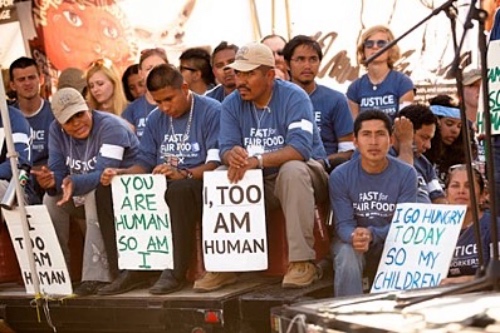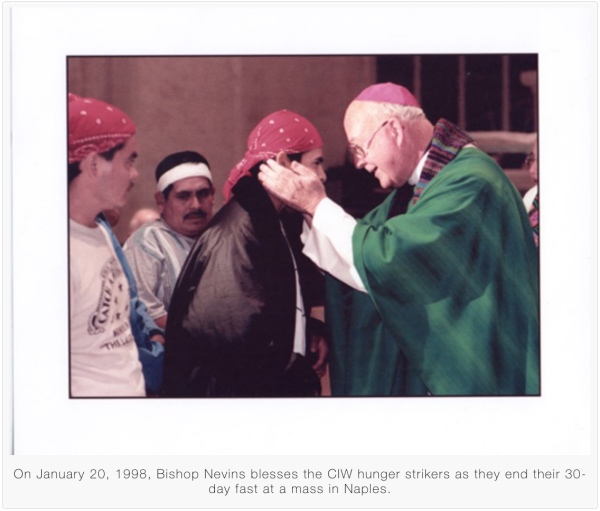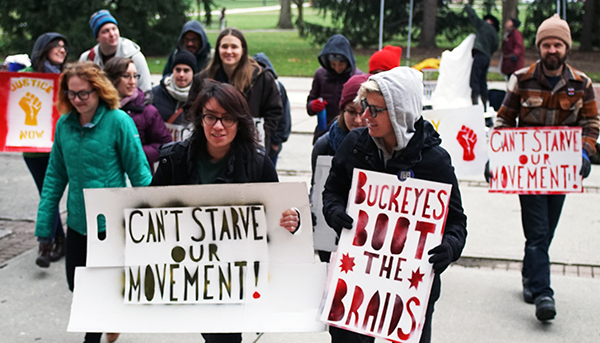
Demanding freedom from sexual violence and slavery in the fields where Wendy’s buys its tomatoes, farmworkers from Immokalee and their allies will hold “Freedom Fast”!
Fast will take place during week of March 11-15 outside the hedge fund offices of Wendy’s Board Chair Nelson Peltz…

“This is just a faster death.”
With those words — and exactly twenty years ago today — six courageous farmworkers launched a month-long hunger strike in Immokalee, demanding nothing more than dialogue with tomato industry leaders about the unconscionable poverty and human rights abuses in Florida’s fields. Workers at the time faced everything from forced labor to widespread sexual harassment and assault, not to mention daily humiliations in the form of systemic wage theft, violence and verbal harassment at the hands of their bosses, and dangerous working conditions. For the hunger strikers, the unremitting predations of their bosses in the fields far outweighed any possible physical consequences from the strike.
Though the growers refused to talk with the workers at the time, twenty years later conditions in Florida’s tomato fields have indeed undergone an unprecedented transformation and become the gold standard in the US produce industry. Through tireless protests and consumer education, and the day-to-day hard work of educating workers, investigating and resolving complaints, and auditing for compliance with the unique Fair Food Code of Conduct, the CIW has radically improved the lives of tens of thousands of farmworkers in Florida’s fields.
The hunger strikers’ extraordinary sacrifice laid the foundation for the groundbreaking Campaign for Fair Food two years later and the success of the Fair Food Program that was to come. Real, profound change was not only necessary and just, it was in fact possible.
Meanwhile, in Mexico…
The following are just a few of the headlines out of Mexico’s produce industry since 2011, when the CIW launched the Fair Food Program in partnership with Florida’s tomato industry:
- “In Mexico’s Fields, Farmworkers Live as if They Were Slaves Every Day,” Univision, November, 2017
- “80 Farmworkers Go Missing after Reporting Labor Abuses in the State of Chihuahua,” El Proceso, June 2017
- “Authorities Free 81 Hired as Slave Labor,” Mexico News Daily, November, 2016
- “At Least 200 Children Rescued in Coahuila: The Illegally Hired Farm Laborers Were Living under Substandard Conditions,” Mexico News Daily, August, 2015
- “Desperate Workers on a Mexican Mega-Farm: ‘They Treated Us like Slaves,'” Los Angeles Times, December, 2014
- “Mexico Rescues 275 Workers From ‘Slavery’ At Tomato Plant In Toliman,” Huffington Post, June, 2013
And those cases, beyond any reasonable doubt, are but the tip of the iceberg of farmworker exploitation in Mexico over the past several years. Widespread violence, fear, and corruption ensure impunity for those who abuse and exploit farmworkers in Mexico, and only the rarest of cases ever slips through the shroud of silence to burst forth in the headlines. Sexual violence against women farmworkers — a topic that is effectively taboo in the press — is no exception to that rule.
Despite Mexico’s woeful human rights record, Wendy’s abandoned its longtime Florida tomato suppliers and shifted its purchases to Mexico after Florida growers implemented the Fair Food Program. In light of that decision and the ongoing human rights crisis in Mexico’s fields, it is time, finally, to ask some hard questions of Wendy’s:
- How many of the cases revealed in the headlines above occurred in Wendy’s supply chain?
- How many of Wendy’s tomatoes picked in Mexico since the fast-food giant left Florida in response to the Fair Food Program were picked by slaves?
- How many of Wendy’s tomatoes are now picked by women who have been sexually assaulted by their bosses in the fields?
Unfortunately, answers to these questions are effectively impossible to come by. While we do know that Wendy’s purchased tomatoes from a grower implicated in one of the cases above (“Trump’s Tomatoes,” Harpers, March 2016), the near total lack of transparency in the company’s supply chain makes connecting its purchases to particular abuses effectively impossible. The consequences of Wendy’s thickly veiled supply chain are surely not unintentional, but Wendy’s has shown no willingness to shed light on its supplier network, and workers and consumers alike have grown tired of waiting.
Freedom Fast!
To protest the ongoing human rights abuses faced by workers in Mexico’s produce industry, and to demand that Wendy’s support verifiable freedom from those abuses in its supply chain by joining the Fair Food Program, farmworkers from Immokalee and their consumer allies are announcing the 5-day Freedom Fast to take place this March 11-15 in New York City outside the hedge fund offices of Wendy’s Board Chair Nelson Peltz.

The upcoming Freedom Fast follows on a long tradition of workers and allies putting their bodies on the line to press for justice. The 30-day Hunger Strike in 1997-1998 was the first, and the longest, of such actions by CIW members, but the 10-day Taco Bell fast in 2003, the week-long Fast for Fair Food outside Publix (pictured at the top of this post) in 2012, and the two recent rolling fasts by students (pictured above) and faith leaders all are part of a rich history of CIW fasts for farmworkers’ fundamental human rights (not to mention, of course, the upcoming National Day of Fasting and Witness by 100+ clergy in over two dozen cities around the country on January 18, the 20th anniversary of the 1998 hunger strike breaking).
If you’re ready to fast alongside farmworkers in New York City from March 11-15, sign up here. We will have much more on the Freedom Fast in the weeks ahead, so check back again after the holidays for statements from the fasters, details on logistics, and how you can join us in New York for what is sure to be an unforgettable new chapter in the history of the Campaign for Fair Food!
